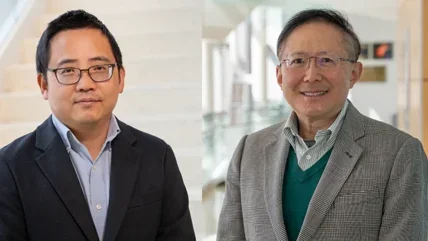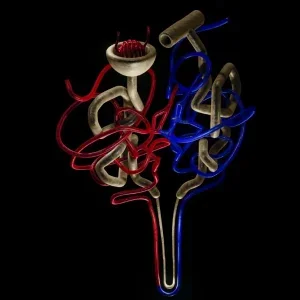
UMass Chan Medical School and Astellas Pharma Inc., a pharmaceutical company conducting business in more than 70 countries, have entered into a sponsored research agreement to proceed with research for an adeno-associated virus (AAV) vector mediated gene therapy for the treatment of Alexander disease, a fatal, ultra-rare disease for which the only treatment option is supportive care.
The research agreement supports research being conducted by Guangping Gao, PhD, the Penelope Booth Rockwell Professor in Biomedical Research, professor of microbiology & physiological systems, director of the Horae Gene Therapy Center and co-director of the Li Weibo Institute for Rare Diseases Research; and Jun Xie, PhD, associate professor of microbiology & physiological systems, who have developed an AAV vector that can express a small RNA silencer that suppresses the mutant proteins that cause Alexander disease in mice.
Dr. Gao and Dr. Xie will conduct additional research activities to accelerate their program toward clinical study, while Astellas will support UMass Chan investigations by providing drug discovery research expertise.
Alexander disease is a progressive central nervous system disorder caused by mutations in the glial fibrillary acidic protein gene that usually has a fatal outcome. Most affected patients do not live beyond their first few years. Alexander disease affects astrocytes, a type of cell that makes up the majority of cells in the CNS and leads to the destruction of white matter in the brain, causing progressively worsening severe intellectual and physical disabilities, and eventually affected individuals will lose life-sustaining abilities. This disease is estimated to occur in approximately one in a million births.
“We are enthused to be working with Astellas,” said Gao. “Their drug discovery research expertise is a critical component in translating this work from bench to bedside, and bringing gene therapy to patients in the clinic who are struggling with this deadly disease.”
Yoshitsugu Shitaka, PhD, chief scientific officer at Astellas, added, “We are thrilled to partner with UMass Chan, a leading academic medical center, and help foster innovation in this important ecosystem. We at Astellas strive to find new ways to treat some of the most challenging diseases, including rare and ultra-rare diseases.
“Gene therapy is a complex breakthrough area where traditional approaches might not be sufficient and ultra-rare diseases like Alexander disease cannot be tackled with the usual pharma models. Only by working closely with academic centers can we advance pioneering work to turn the promise of cell and gene therapies into meaningful treatments for patients,” said Dr. Shitaka.
“Silencing the mutant protein that causes Alexander disease with our artificial miRNA could be a promising therapeutic approach to treatment,” explained Xie. “Collaborating with Astellas will bring us one step closer to our goal of helping patients with this disease.”
The partnership was facilitated by BRIDGE Innovation and Business Development at UMass Chan Medical School.






